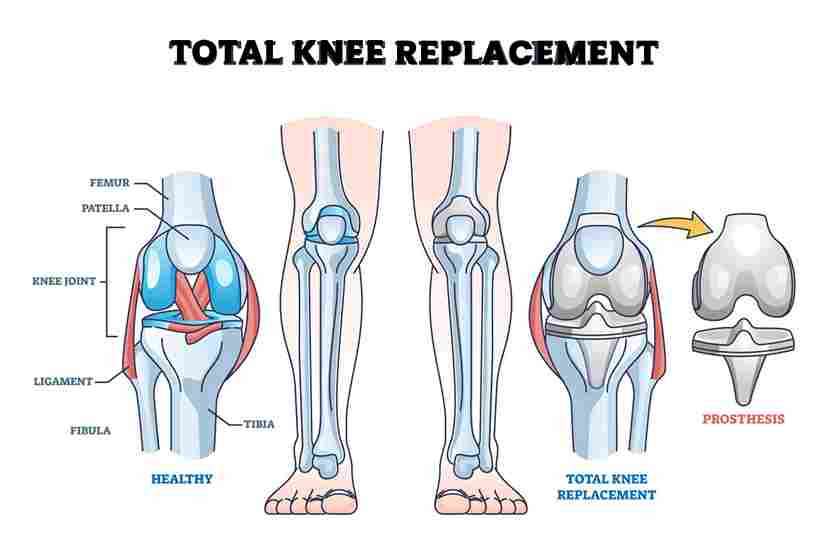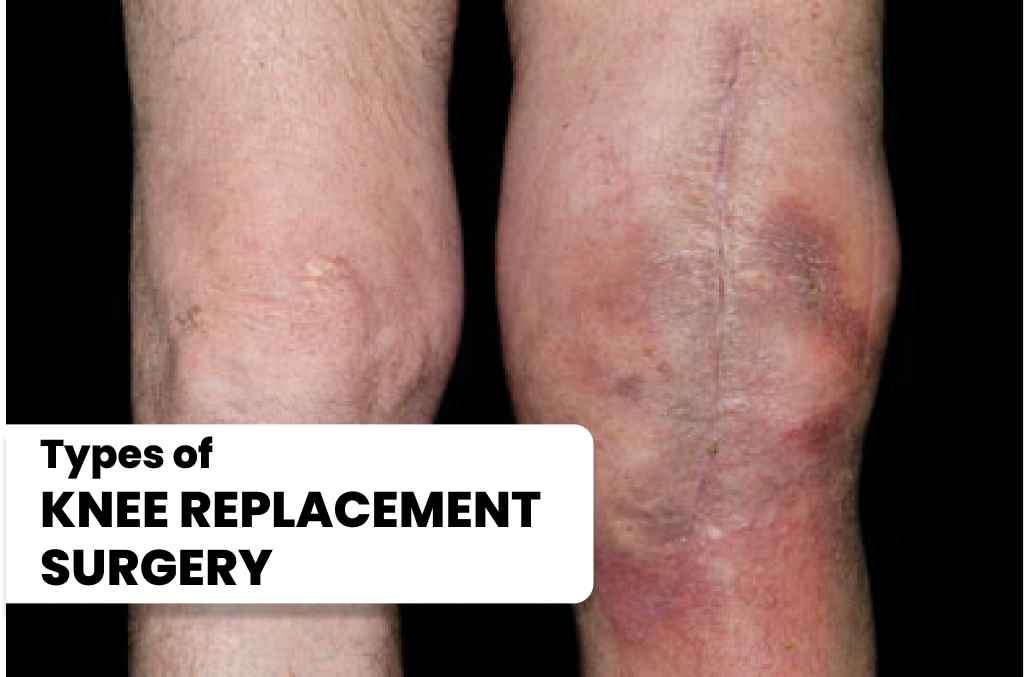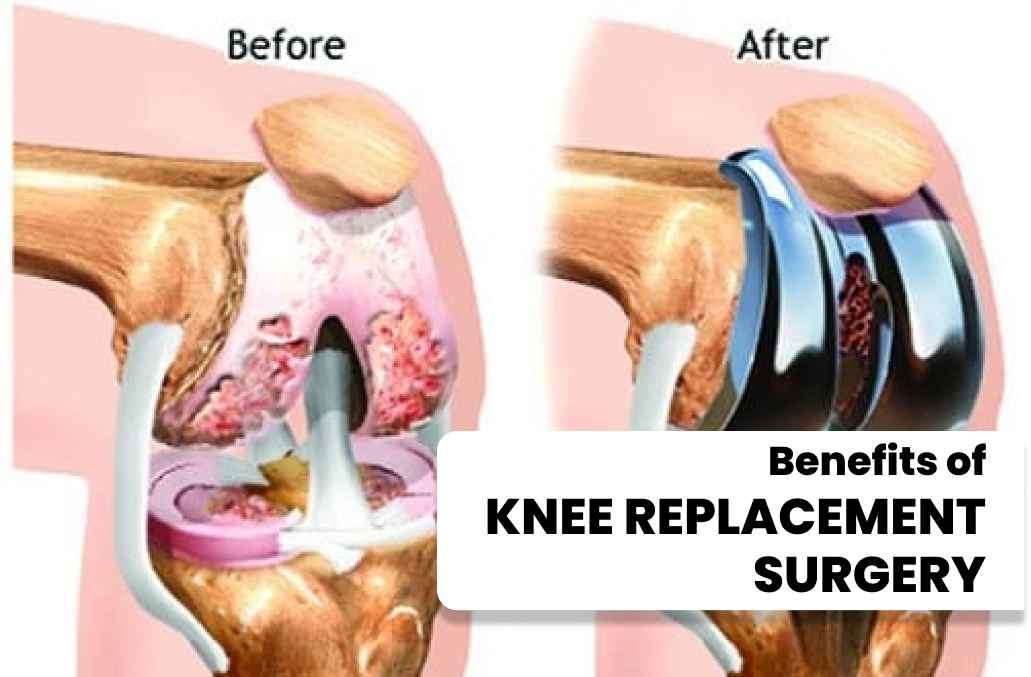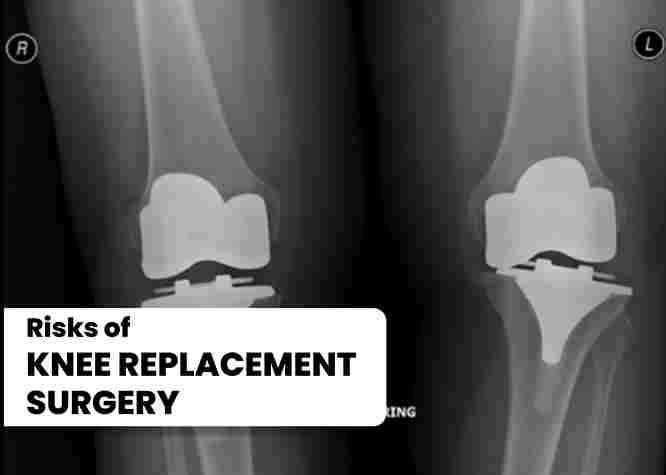Knee replacement, also known as knee arthroplasty, is a surgical
procedure performed to replace a damaged or worn-out knee joint with an
artificial implant.
Call us to book a appointment with the best Ortho specialist near you.
Knee replacement, also known as knee
arthroplasty, is a surgical procedure that is used to treat knee pain and
improve knee function in people who have severe arthritis or other knee-related
conditions. The procedure involves removing damaged or worn parts of the knee
joint and replacing them with artificial components made of metal, plastic, or
ceramic. Knee replacement is a major surgery that requires careful preparation
and a dedicated recovery period, but it can provide significant relief for
people with knee problems. Visit www.doctorsapp.in to know more.

Knee replacement, also known as knee arthroplasty, is a surgical procedure that is used to treat knee pain and improve knee function in people who have severe arthritis or other knee-related conditions. The procedure involves removing damaged or worn parts of the knee joint and replacing them with artificial components made of metal, plastic, or ceramic. Knee replacement is a major surgery that requires careful preparation and a dedicated recovery period, but it can provide significant relief for people with knee problems. Visit www.doctorsapp.in to know more.
There are several types of knee replacement surgery, each with its own benefits and risks. The most common types of knee replacement surgery include: 1. Total Knee Arthroplasty: This is the most common type of total knee replacement surgery. It involves replacing the entire knee joint with an artificial joint made of metal, plastic, or ceramic. Total joint replacement is recommended for people who have severe arthritis or damage to both sides of the knee joint. 2. Partial Knee Replacement Surgery: This is a less invasive procedure that involves replacing only one side of the knee joint with an artificial component. Partial knee replacement is recommended for people who have damage to one side of the knee joint or who have limited knee damage. 3. Bilateral total Knee Replacement: This involves replacing both knees with artificial joints in a single surgery. Bilateral knee replacement is recommended for people who have severe arthritis or damage in both knees.

There are several types of knee replacement surgery, each with its own benefits and risks. The most common types of knee replacement surgery include:
1. Total Knee Arthroplasty: This is the most common type of total knee replacement surgery. It involves replacing the entire knee joint with an artificial joint made of metal, plastic, or ceramic. Total joint replacement is recommended for people who have severe arthritis or damage to both sides of the knee joint.
2. Partial Knee Replacement Surgery: This is a less invasive procedure that involves replacing only one side of the knee joint with an artificial component. Partial knee replacement is recommended for people who have damage to one side of the knee joint or who have limited knee damage.
3. Bilateral total Knee Replacement: This involves replacing both knees with artificial joints in a single surgery. Bilateral knee replacement is recommended for people who have severe arthritis or damage in both knees.
Knee replacement surgery can provide several benefits for people with knee problems, including: 1. Pain Relief: Knee replacement surgery can significantly reduce knee pain, allowing people to resume daily activities and enjoy a better quality of life. 2. Improved Knee Function: Knee replacement surgery can improve knee function, making it easier to walk, climb stairs, and perform other activities. 3. Long-term Results: Knee replacement surgery can provide long-term results, with many people experiencing pain relief and improved knee function for several years after the surgery.

Knee replacement surgery can provide several benefits for people with knee problems, including:
1. Pain Relief: Knee replacement surgery can significantly reduce knee pain, allowing people to resume daily activities and enjoy a better quality of life.
2. Improved Knee Function: Knee replacement surgery can improve knee function, making it easier to walk, climb stairs, and perform other activities.
3. Long-term Results: Knee replacement surgery can provide long-term results, with many people experiencing pain relief and improved knee function for several years after the surgery.
1. Infection: There is a risk of infection after knee replacement surgery, which can be treated with antibiotics. 2. Blood Clots: Blood clots can form in the legs after knee replacement surgery, which can be prevented with blood thinners and compression stockings. 3. Nerve Damage: There is a risk of nerve damage during knee replacement surgery, which can cause numbness, tingling, or weakness in the legs. 4. Loosening or Dislocation of the Implant: The artificial knee joint can loosen or dislocate over time, which may require revision surgery.

1. Infection: There is a risk of infection after knee replacement surgery, which can be treated with antibiotics.
2. Blood Clots: Blood clots can form in the legs after knee replacement surgery, which can be prevented with blood thinners and compression stockings.
3. Nerve Damage: There is a risk of nerve damage during knee replacement surgery, which can cause numbness, tingling, or weakness in the legs.
4. Loosening or Dislocation of the Implant: The artificial knee joint can loosen or dislocate over time, which may require revision surgery.
Knee replacement operation is a major procedure that requires careful preparation and a dedicated recovery period. Here is what to expect for knee replacement surgery: 1. Pre-operative Evaluation: Before the surgery, you will undergo a thorough evaluation to assess your overall health, including blood tests, X-rays, and a physical exam. The doctor will also review your medical history and medications to ensure that you are in good condition for the surgery. 2. Anesthesia: Knee replacement surgery is performed under general anesthesia, which means that you will be asleep during the procedure. In some cases, a spinal block may be used to numb the lower half of your body. 3. Surgery: The surgery typically takes 1-2 hours to complete. During the surgery, the damaged or worn parts of the knee joint are removed and replaced with artificial components made of metal, plastic, or ceramic. The surgeon will make an incision in the knee to access the joint and use specialized tools to remove the damaged tissue and bone. 4. Recovery Room: After the surgery, you will be taken to the recovery room to be monitored as the anesthesia wears off. You may feel groggy or nauseous for several hours after the surgery. 5. Hospital Stay: Most people stay in the hospital for 1-3 days after knee replacement surgery. During this time, the doctor will monitor your recovery and provide pain management medication as needed. 6. Physical Therapy: After you leave the hospital, you will need to attend physical therapy sessions to help improve knee function and range of motion. Physical therapy may begin in the hospital and continue for several weeks after you return home. 7. Home Recovery: Once you are released from the hospital, you will need to follow a home recovery plan that includes rest, medication, and exercises to help improve knee strength and flexibility. It is important to follow the doctor's instructions to minimize the risk of complications and promote healing. 8. Follow-up Visits: You will need to attend follow-up visits with the doctor to monitor your recovery and assess the success of the surgery. These visits may include X-rays and other tests to ensure that the artificial joint is functioning properly.

Knee replacement operation is a major procedure that requires careful preparation and a dedicated recovery period. Here is what to expect for knee replacement surgery:
1. Pre-operative Evaluation: Before the surgery, you will undergo a thorough evaluation to assess your overall health, including blood tests, X-rays, and a physical exam. The doctor will also review your medical history and medications to ensure that you are in good condition for the surgery.
2. Anesthesia: Knee replacement surgery is performed under general anesthesia, which means that you will be asleep during the procedure. In some cases, a spinal block may be used to numb the lower half of your body.
3. Surgery: The surgery typically takes 1-2 hours to complete. During the surgery, the damaged or worn parts of the knee joint are removed and replaced with artificial components made of metal, plastic, or ceramic. The surgeon will make an incision in the knee to access the joint and use specialized tools to remove the damaged tissue and bone.
4. Recovery Room: After the surgery, you will be taken to the recovery room to be monitored as the anesthesia wears off. You may feel groggy or nauseous for several hours after the surgery.
5. Hospital Stay: Most people stay in the hospital for 1-3 days after knee replacement surgery. During this time, the doctor will monitor your recovery and provide pain management medication as needed.
6. Physical Therapy: After you leave the hospital, you will need to attend physical therapy sessions to help improve knee function and range of motion. Physical therapy may begin in the hospital and continue for several weeks after you return home.
7. Home Recovery: Once you are released from the hospital, you will need to follow a home recovery plan that includes rest, medication, and exercises to help improve knee strength and flexibility. It is important to follow the doctor's instructions to minimize the risk of complications and promote healing.
8. Follow-up Visits: You will need to attend follow-up visits with the doctor to monitor your recovery and assess the success of the surgery. These visits may include X-rays and other tests to ensure that the artificial joint is functioning properly.
|
Serial No |
City |
Minimum Cost (INR) |
Average Cost (INR) |
|
1 |
Delhi |
2,00,000 |
3,00,000 |
|
2 |
Mumbai |
2,00,000 |
3,50,000 |
|
3 |
Kolkata |
2,00,000 |
2,75,000 |
|
4 |
Bangalore |
2,00,000 |
3,25,000 |
|
5 |
Chennai |
2,00,000 |
3,00,000 |
|
6 |
Hyderabad |
2,00,000 |
3,25,000 |
|
7 |
Pune |
1,80,000 |
3,00,000 |
|
8 |
Ahmedabad |
1,75,000 |
2,75,000 |
|
9 |
Jaipur |
1,70,000 |
2,75,000 |
|
10 |
Lucknow |
1,70,000 |
2,50,000 |
|
11 |
Kanpur |
1,70,000 |
2,50,000 |
|
12 |
Nagpur |
1,70,000 |
2,75,000 |
|
13 |
Coimbatore |
1,70,000 |
2,50,000 |
|
14 |
Patna |
1,60,000 |
2,25,000 |
|
15 |
Bhopal |
1,60,000 |
2,50,000 |
|
16 |
Ludhiana |
1,60,000 |
2,50,000 |
|
17 |
Agra |
1,50,000 |
2,25,000 |
|
18 |
Nashik |
1,50,000 |
2,50,000 |
|
19 |
Vadodara |
1,50,000 |
2,25,000 |
|
20 |
Madurai |
1,40,000 |
2,25,000 |
|
Serial No |
Hospital Name |
Address |
Contact Info |
|
1 |
All India Institute of Medical Sciences (AIIMS), New Delhi |
Ansari Nagar, New Delhi - 110029 |
+91-11-26588500, 26588700 |
|
2 |
Post Graduate Institute of Medical Education and Research (PGIMER), Chandigarh |
Madhya Marg, Sector 12, Chandigarh - 160012 |
+91-172-2746018, 2756565 |
|
3 |
King George's Medical University (KGMU), Lucknow |
Shah Mina Road, Chowk, Lucknow - 226003 |
+91-522-2257450, 2257451 |
|
4 |
Safdarjung Hospital, New Delhi |
Ring Road, Opposite AIIMS, Ansari Nagar, New Delhi - 110029 |
+91-11-26730000, 26165060 |
|
5 |
Government Medical College and Hospital (GMCH), Chandigarh |
Sector 32, Chandigarh - 160047 |
+91-172-2601023, 2608488 |
|
6 |
Sawai Man Singh (SMS) Hospital, Jaipur |
JLN Marg, Near Rambagh Circle, Jaipur - 302004 |
+91-141-2619020, 2622484 |
|
7 |
Dr. Ram Manohar Lohia (RML) Hospital, New Delhi |
Baba Kharak Singh Marg, Near Gurudwara Bangla Sahib, Connaught Place, New Delhi - 110001 |
+91-11-23404444, 23743725 |
Please Wait..